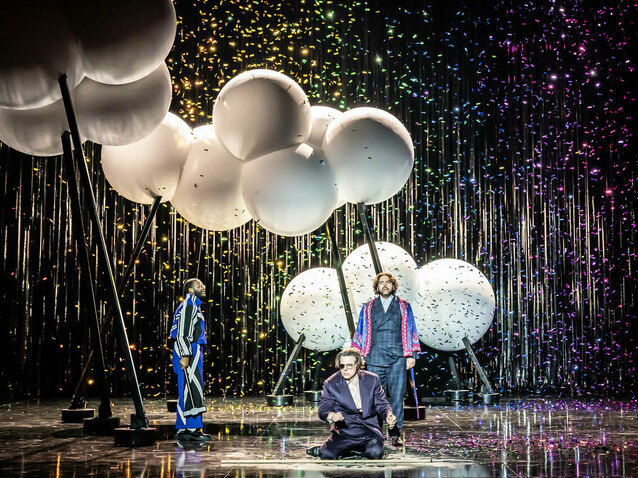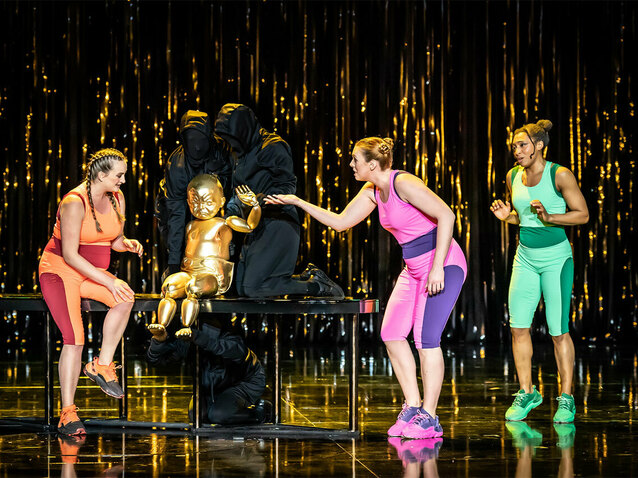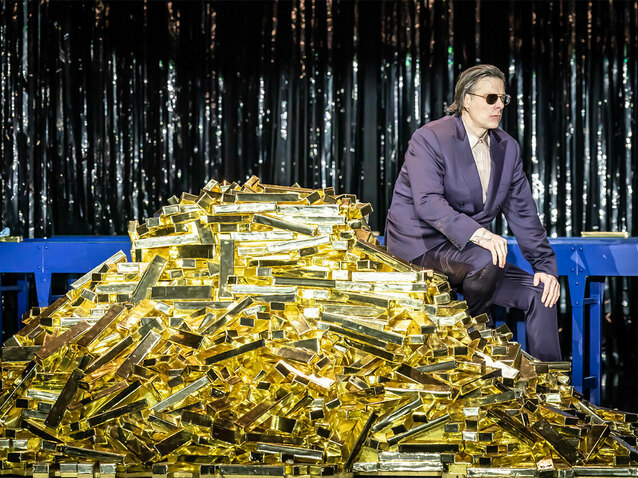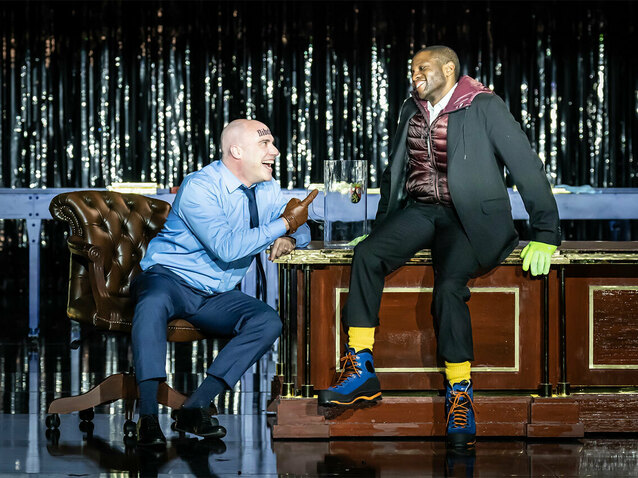 © Mars Brenner
© Mars Brenner
Das Rheingold, performed here in English as The Rhinegold, is the first opera in Richard Wagner’s tetralogy Der Ring des Nibelungen or Ring Cycle. It sets in motion the story that plays out across the four operas, and establishes the central theme of power versus love. It sees the dwarf, or Nibelung, Alberich steal the gold that is guarded by the Rhinemaidens and forge it into a ring that makes the bearer all powerful. He is only able to do so, however, by renouncing love, which in the world we see before us no one has ever done before.
Meanwhile, the chief god Wotan faces his own crisis as he commissioned the giants Fasolt and Fafner to build Valhalla, a fortress that was supposed to put a seal on his supremacy over the whole world. However, in payment he promised them his wife’s sister Freia, which is not only morally reprehensible, but creates a tangible problem as Wotan cannot afford to lose her since she tends the golden apples that keep the gods eternally youthful.
On hearing that Alberich possesses this all powerful ring, the giants agree to relinquish Freia if Wotan can give them that instead. This leads Wotan and his ‘adviser’, the demigod Loge, to descend to Nibelheim, the realm of the Nibelungen, where they discover that Alberich has used the ring’s power to enslave the rest of his race into mining gold for him. Through cunning they succeed in capturing him, with the price of his freedom being the ring. Alberich thus gives it up, but in the process curses the object so it will bring misery and death to those who possess it, and consume those who desire it with an insatiable envy.
Wotan still faces multiple problems because the right thing, as Loge points out, would be to return the ring to the Rhinemaidens, but he cannot do that if he is to relinquish Freia and he also wants to keep it for himself. The earth goddess Erda then appears and advises him to give it up, saying she foresees the end of the gods. Wotan consequently gives the ring to the giants, and Fafner promptly kills Fasolt in order to possess it, thus proving Alberich’s curse is all too real. Wotan has, however, paid his debt and so the end of the opera does see the gods ascend to Valhalla, though they have left a trail of destruction in their wake that, even at this stage, it seems obvious will come back to bite them.
English National Opera began its new Ring Cycle, directed by Richard Jones, in 2021 with the second and most famous opera in the tetralogy, The Valkyrie, but its presentation of the first feels substantially more successful. Some very intelligent ideas are contained within it, and the production comes across as highly coherent since it is very easy to grasp what is going on. However, in its attempts to make its points clearly it sometimes pushes things too far, so that the results are simply comical. There is certainly humour to be found in Wagner, and this production deliberately brings it out as a way of laying bare the bizarre nature of the gods’ dealings, but on some occasions the comedy is pushed to such an extent that it undermines the gravitas that the opera certainly possesses.

ENO The Rhinegold 2023, Eleanor Dennis, Katie Stevenson, Idunnu Munch (c) Marc Brenner
In this version, the drama begins before a note has even been played. We witness a man dragging or carrying a tree four times across the stage, with it starting out with leaves and then growing smaller and deader on each reappearance until finally it becomes Wotan’s spear. This pertains to the chief god creating it by hacking away at the World Ash Tree, and with the figure starting out naked and ending up fully clothed the emphasis is on how society and the lust for power corrupt nature. If there is a criticism of this move it is that it interferes with Wagner’s idea of a ‘total work of art’ because the Prelude to Rhinegold in E flat major is designed to signify, in some way at least, the dawn of time and creation, so preceding it with anything undermines the parameters that the composer set for the opera. Nevertheless, since this extra routine is kept so separate from the music and sets in motion some strong points that are subsequently built upon, the merits certainly outweigh the disadvantages.
Designer Stewart Laing’s generally bare stage is surrounded by shiny string curtains that are excellent at portraying the Rhine. This is because their natural movement and the reflections they generate provide the perfect complement to the Prelude where it is infinite fluidity that needs to be captured rather than any type of sharp rhythm. The initially gentle but expressive movements of the Rhinemaidens (brilliantly sung and acted by Eleanor Dennis, Idunnu Münch and Katie Stevenson) also work well, although the introduction of several supernumeraries to the scene does rather blunt its impact. Having the Rhinemaidens sway against, or circle with, them makes the nixies feel like part of a greater routine, which removes the focus from their own highly personal confrontation with Alberich. The Rhinegold is revealed to be a golden baby, operated by puppeteers, which, like the World Ash Tree before it, is shown in four states after the Nibelung steals it. In this way, it moves from being a baby to a bar of gold to the ring, thus revealing how Alberich’s own act of theft has also corrupted nature, and, most importantly, that he and Wotan are cut from the same cloth.
The mountain outside Valhalla reveals huge white balls that represent clouds, and feel reminiscent of Maria Bartuszová’s sculptures currently on display at Tate Modern. The gods themselves wear a variety of costumes that would seem broadly to come from the post-war era, although not all from the same period. Much has been written about Wotan as a bourgeois figure, but this bunch’s garish costumes suggest they are part of a rising middle class who have bullied their way to success, perhaps by being oblivious to the needs and feelings of others, and could all too easily and humanly see their power slip away again.

ENO The Rhinegold 2023, John Relyea (c) Marc Brenner
With the giants wearing boiler suits to mark them out as manual labourers, the first scene where we see them with the gods is generally successful. Wotan sits behind a table as if using boardroom-style power to assert authority over the giants in his negotiations, but later as things become more desperate the giants sit behind it as if they have turned the tables. At another point, our eye is suddenly drawn to the fact that practically every character is, quite literally, following Loge. However, while such subtle placement of the figures often produces dividends, there are other times when it simply does not allow for the level of drama that is required. When Donner and Froh move to stop the giants from taking Freia there is no sense of them springing into the action, as the music suggests they do, while Fasolt and Fafner are miles from Freia as opposed to being in the process of dragging her away.
There are also moments when the point being made is appropriate, but its presentation does seem to cheapen the experience. Having Wotan’s wife Fricka, Donner and Froh cross the stage with what seem like tights on their heads to emphasis their weakened state during the descent to Nibelheim music elicits a laugh at a time when we need to focus on the seriousness of what awaits Wotan and Loge. Introducing a series of Alberich doubles to poke and prod his brother Mime when Alberich is invisible is clever because it emphasises how Mime cannot run or hide from him, but by the time so many of these have appeared that they have beaten Mime to a pulp it feels like overkill. Having the three Norns (who normally only appear in Twilight of the Gods) awaken Erda during the ascent from Nibelheim, who reacts like a worried grandmother, also feels too comical, and thus undermines the sincerity of the earth goddess. However, once she has been set up in this way, her slapping Wotan when she sees him is quite amusing while the kiss at the end of their encounter is entirely in keeping with what the pair do after the end of the opera.
Some ideas work particularly well. Many productions see Freia leading Fasolt on in one way or another at the start as a method of introducing another dimension to the drama, and yet it makes no sense that she would do so. It is, however, perfectly plausible that once she has been released again, and in face of the distasteful gods, she might look back lovingly on one who she realises treated her kindly. In bringing this idea out to the full, Jones has Freia crying over the dead Fasolt, to the point of not processing with the other gods to Valhalla at the end, although the impact of the gesture is marred by us physically seeing her sobbing over a dummy. This is because when Fafner kills Fasolt, the performer disappears to be replaced with a dummy that Fafner can pulverise, and this makes the entire act seem risible rather than numbing as it should be.

ENO The Rhinegold 2023, Leigh Melrose, Frederick Ballentine (c) Marc Brenner
Frederick Ballentine is an outstanding Loge, with the turn of his head and glint in his eye putting him in control in every way. As a performer, he has the presence to command the stage, and he uses this to make the trickster the ultimate driving force, while also revealing a fabulous tenor. John Relyea is an equally excellent Wotan, whose bass is perfectly suited to the role, and whose actions come across as particularly distasteful. Normally, there is at least some sense of nobility in the character, but with him donning a purple suit and shades (though the latter are because he is missing one eye) he feels like a charlatan in every way, which is exactly what Jones and Relyea intended to make him. This creates an interesting dynamic between Loge and Wotan as in Nibelheim it becomes clear just how much more the former is in control, with the chief god being slow to pick up on even the most basic actions required of him. By the same token, the demigod’s contempt for Wotan at the end feels as clear as in any production as the two practically face off against each other.
With his superb baritone, Leigh Melrose is a brilliant Alberich who undergoes a clear transformation from long-haired ‘teenager’ anxious to get some action to power mad skinhead once he has forged the ring. With their excellent voices, Simon Bailey and James Creswell contrast the characters of Fasolt and Fafner extremely well, with Fasolt latterly donning a suit as a way of showing his kind treatment of, and devotion to, Freia. Christine Rice is luxury casting as Erda, and Madeleine Shaw a multi-faceted Fricka. There is also notably strong support from Katie Lowe as Freia, Blake Denson as Donner and Julian Hubbard as Froh, while John Findon stands out in the fairly small role of Mime. Martyn Brabbins’ conducting of the ENO Orchestra is highly accomplished. His is a sharp and focused interpretation, and if this means that the Prelude lacks a sense of underlying mystery by feeling a little too forthright, for the most part it ensures that the score is exquisitely handled. With the harps positioned in a box to one side of the pit, their divine sound also leaves a great impression.
It would be wrong to give away too much about the ending, but the depiction of the rainbow bridge that takes the gods to Valhalla is as beautiful as any to be found in this opera. The final bars do not focus on the triumph of the gods in the moment as they process to Valhalla, leaving us to imagine the problems that lie ahead, but rather lay the difficulties bare before us. This fortress of Valhalla really is a means of locking the world out, and that is totally necessary because the gods have angered others so much that they will certainly be coming for them. It is the type of move that, like many others in this production, could be accused of pushing things too far and thus being inappropriate, but it is done so well that it is impossible not to revel in its ingeniousness. As a result, if one emerges from this Rhinegold with a huge smile, something one would not normally imagine doing with this opera, it may be for the right reasons after all.
By Sam Smith
The Rhinegold | 18 February – 10 March 2023 | London Coliseum
the 21 of February, 2023 | Print
Comments